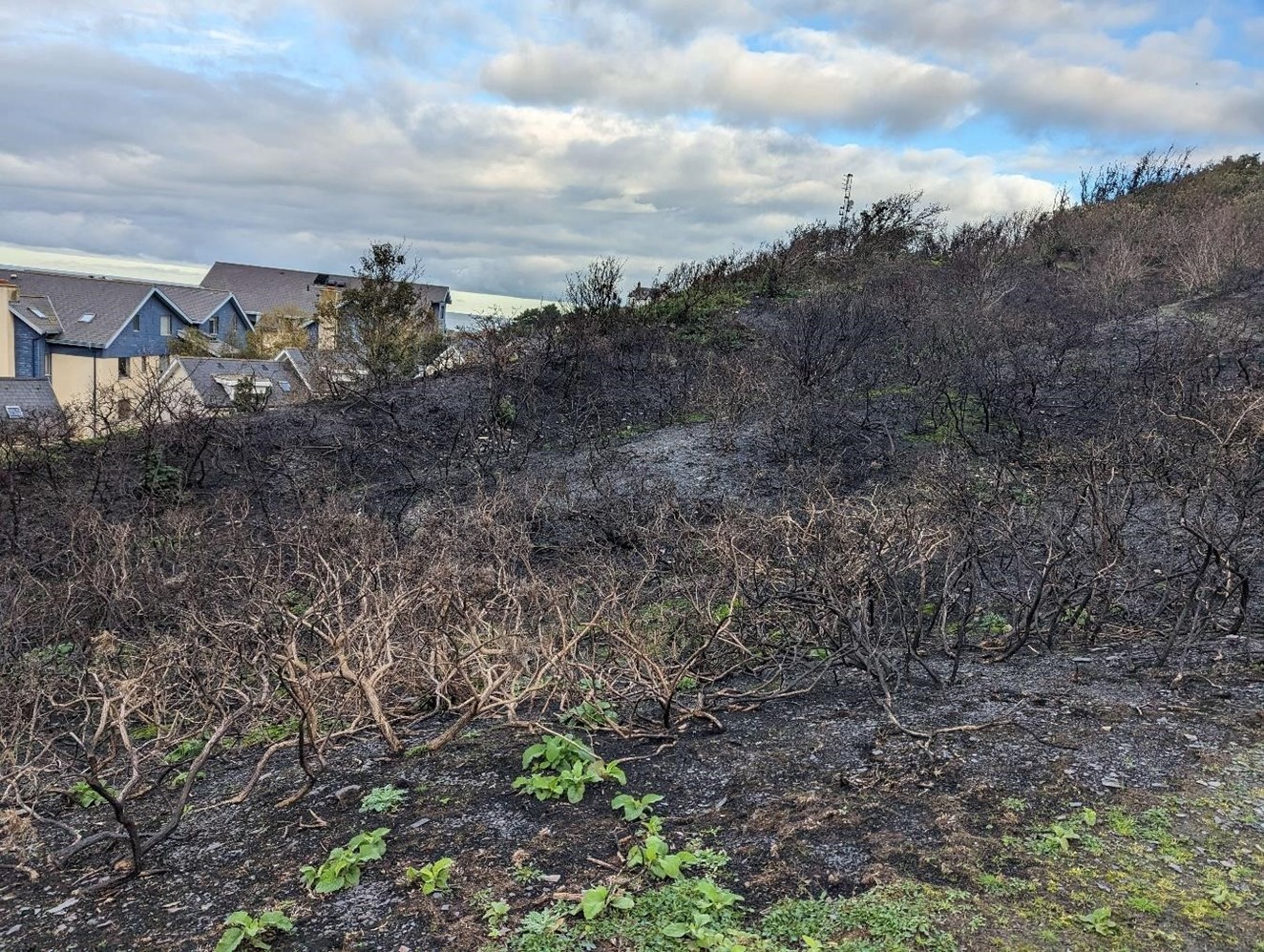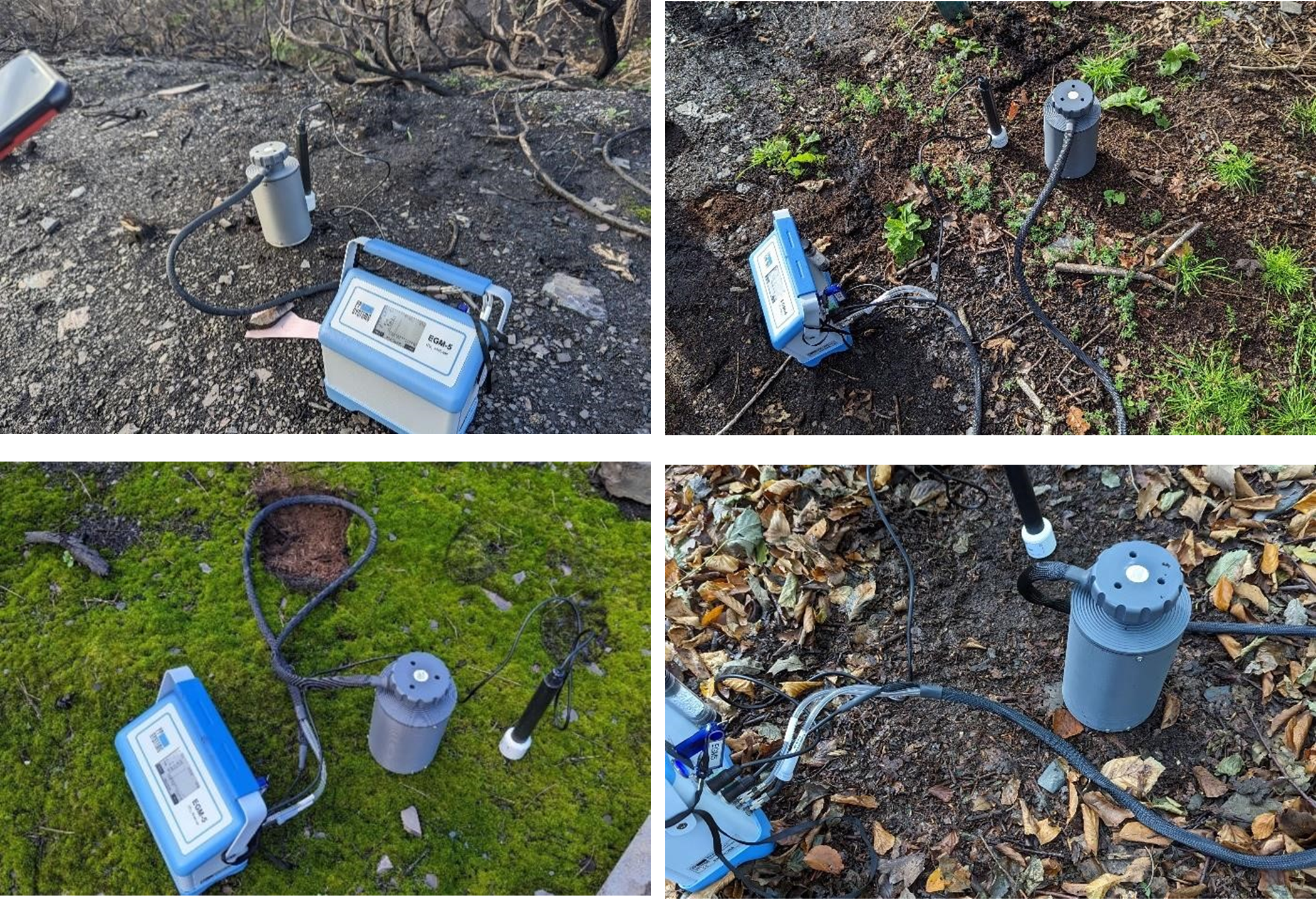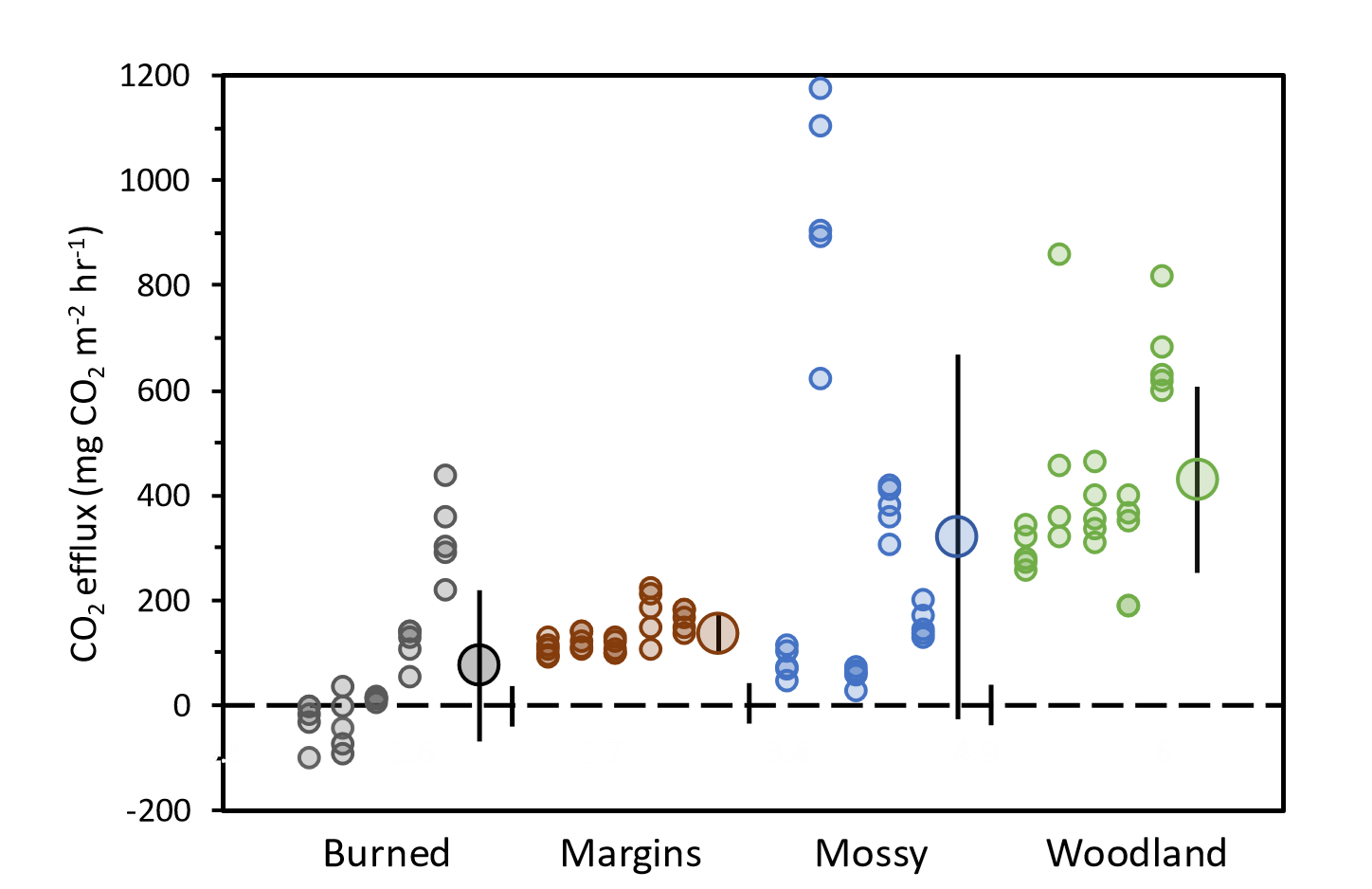Living Labs
What are Living Labs?
Living labs are projects and research opportunities undertaken across our campuses that relate to and have a positive, real world impact on sustainability and the environment.
Involving students, staff and the wider community, living labs improve cooperation between the university and locals, in addition to assessing AU's environmental impacts and offering ideas for improvements.
Living Lab Projects
See below for a few examples of our living lab projects.
Wildfires by the Sea
Wildfires by the Sea - Carbon Dioxide Efflux after Wildfire in Penglais Nature Reserve

Fig1: Aftermath of wild-fire at Penglais Woods, Carwyn Davies
Relates to:
- SDG 13 - Climate Action
- SDG 15 - Life on Land
In June 2023, a wildfire began in Penglais Nature Reserve due to high temperatures during a heat wave, an issue enhanced by the effects of climate change. After the fire had subsided, students took the opportunity to investigate the effects on many environmental factors, such as plant life, wildlife and soil quality throughout the woods.
Under the supervision of Prof. Stephen Tooth, students Carwyn Davies and Cindy Farrell investigated soil characteristics. Davies' work focused primarily on CO2 efflux, an attribute of soils vulnerable to climate change.
"In October, we went to the Western area of Penglais Nature Park to measure the CO2 efflux of the soil in four different land cover types across it using an infrared gas analyser. We also recorded soil temperature and soil moisture, and we used a sample of woodland soil to analyse the effects of moderate and intense dry conditions and rewetting and saturated conditions. We also investigated the early recovery of the severely scorched areas of the nature park and used the data we obtained to infer the effects of a warming climate on the nature park."

Fig 2: Equipment used to monitor CO2 efflux, moisture and temperature of soils
Wildfires are a frequent phenomenon in heathlands and shrublands in higher latitudes and pose a threat to infrastructure, human health, and ecosystem services. In addition, wildfires can drastically alter habitats for wildlife, and carbon stocks sequestered and released from an area. The frequency of wildfires is modelled to increase during the 21st century due to climate change. Wildfires alter soil carbon (C) stocks and vegetation biomass, thus altering soil microbial communities and contributions of root respiration, both of which contribute to soil CO2 efflux. A wildfire which struck Parc Natur Penglais, Aberystwyth, in June 2023 warranted an investigation into CO2 efflux across land cover types affected by the fire and neighbouring forest.
The burned area had the lowest CO2 efflux and there was evidence of biological soil crusts, and that potential increases in moisture and temperature will further decrease CO2 efflux. Marginal areas had a higher CO2 efflux in addition to the highest moisture content with temperature having a minor role in CO2 efflux. The mossy areas exhibited highly variable CO2 efflux, indicating that early secondary succession may lead to a short-term increase in CO2 efflux. The woodland sites had the highest CO2 efflux due to the larger C stocks in this land cover type and the proximity of beech tree roots.
Soil CO2 efflux is vulnerable to climate change, and this has been demonstrated with laboratory analysis, with temperature alongside the Birch effect increasing CO2 efflux, repeated drought-rainfall events are likely to lead to higher net contributions to climate change.
Davies' utilisation of the campus as a research site has highlighted the significance of increasing temperatures due to climate change close to home.

Fig 3: Graph showing the soil CO2 efflux for the burned, margins, mossy, and woodland sites.
Smart Home Facility
Smart Home Facility
Lead: Dr Patricia Shaw - phs@aber.ac.uk
Relates to:
- SDG 3 - Good Health & Wellbeing
- SDG 11 - Sustainable Cities and Communities
Innovations in assisted-living technology looking into improving quality of life for elderly patients.
Read more here.
Governance of Climate Change - Simulation
Governance of Climate Change - Simulation Module
Lead: Dr. Hannah Hughes, hah60@aber.ac.uk
Relates to:
SDG 4 - Quality Education
SDG 13 - Climate Action
As part of Interpol's undergraduate course, students can participate in a simulation exercise through the Governance of Climate Change module to develop understanding of how decisions are made surrounding climate action. Students are assigned roles at the start of the module, and over the course of the term will act within these roles to make decisions on climate policy. Students will act as governments, negotiating and prioritising, and finally holding a summit where a list of policies will be enacted.
Read the module handbook for more information.
Clover Innovations
Clover Innovations
Lead: Professor Leif Skøt, lfs@aber.ac.uk
Contact: Dr. Gancho Slavov, gas38@aber.ac.uk
Relating to:
SDG 13 - Climate Action
SDG 15 - Life on Land
Research into persistent clover varieties to increase the rate of nitrogen fixation in soils, helping to improve local and global soil quality.
Read more here.
Auxilium Software and Veteran's Legal Link
Auxilium Software and Veteran's Legal Link
Lead: Dr. Olaoluwa Olusanya, ooo@aber.ac.uk
Relates to:
- SDG 3 - Good Health and Wellbeing
- SDG 10 - Reduced Inequalities
- SDG 16 - Peace, Justice and Strong Institutions
Auxilium software works to improve communications between clients and public sector organisations, and was developed to aid 'Veteran's Legal Link', offering free legal advice and signposting to retired veterans and emergency services staff.
Veteran's legal Links offers internships and volunteer opportunities for students who want to get involved in help and research.
Read more about Auxilium software.
Read more about Veteran's Legal Link.
ABERforward Placements
ABERfoward Placements
Contact: careers@aber.ac.uk
Relates to:
- Range of SDGs (dependent on research)
The main aim of ABERforward placements is to provide learning and development opportunities that help equip Aberystwyth University students and recent graduates with the skills, employability and career-readiness required to successfully plan and implement meaningful next steps into graduate life.
These are paid placements where students take part in research positions, often taking place on the university campus.
For more information on placements, offering placements and eligibility, read here.
WWII Garden - A Living History Garden Project
WWII Garden - A Living History Garden Project
Contact: Siân Nicholas
Relates to:
- SDG 2 - Zero Hunger
- SDG 3 - Good Health and Wellbeing
- SDG 4 - Quality Education
Early in WWII, the Ministry of Agriculture launched their ‘Dig for Victory’ campaign, providing instructions for the nation to grow their own vegetables to relieve pressure on wartime food shortages. Siân Nicholas, Professor of History and Welsh History, decided to see how this would look almost 80 years later, by planting our own WWII garden.
The garden is also utilised in our History degree through the Year 1 ‘Hands on History’ module as a case study and field trip in environmental history, to give students a deeper insight as to what the war-time effort may have looked like.
Surplus food is donated to local organisations and charities like Aber Food Surplus and St Paul’s Methodist Church’s ‘Pay as you Feel Café’, making sure we reduce food waste and that no efforts in the garden are wasted.
Find more information on our community gardens page.
